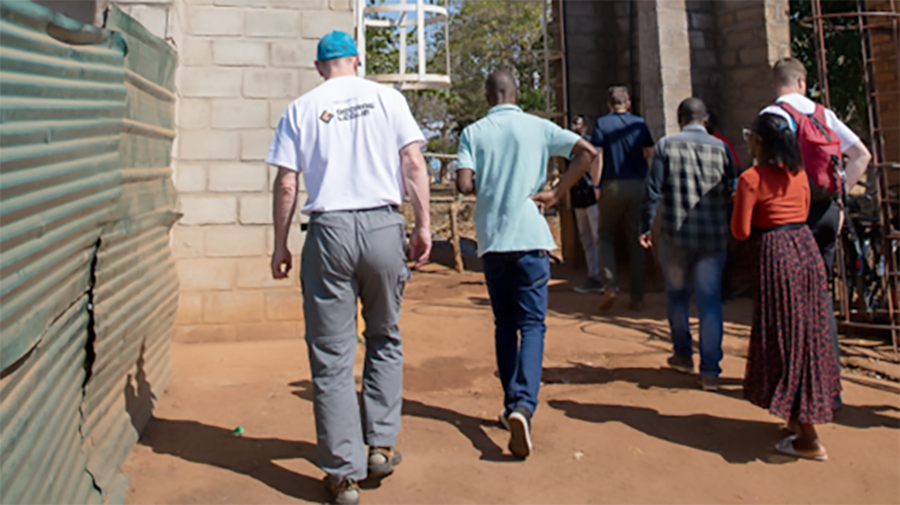
Ian Jardine was given the opportunity by George Leslie to be involved in a WaterAid trip to Malawi in June of 2024. This was an experience he did not want to miss.
He said: “Over the years I have heard some amazing stories from previous Scottish Water and WaterAid trips. Most recently, from Tony Fry who shared the life changing benefits and importance of sustainable water, sanitation, and hygiene to people living in some of the most impoverished areas in the world.
“To experience this for myself and speak with the people whose lives would be changing as a result of efforts made by WaterAid, Scottish Water, and George Leslie seemed unmissable.”
After a quick stock up on vaccinations, Ian, along with Karen Stirling (Senior Quantity Surveyor) and Mark Hunter (General Manager of Development and Operational Services) of Scottish Water, and Elizabeth McKernan (Senior Partnerships Manager) and Alex James (Partnerships Development Manager) of WaterAid UK set off from Edinburgh Airport to Malawian capital Lilongwe via Addis Adaba (Ethiopian capital) and Lubumbashi (capital city of the Democratic Republic of Congo). Upon landing, Ian and his travelling group met up with the WaterAid Malawi team – Natasha, Clement, and Dennis.
Ian said: “On our first night in Lilongwe, we travelled South to the Zomba district. Although the travel took up a significant part of our day every day, it was one of the most enlightening and spectacular parts of the trip. We got to see the landscape, the infrastructure, and how the local people lived and worked.”
Deforestation is a major issue in Malawi. As of June 2024, only 3% remains forested. This is due to the consistent development of communities and the timber providing an essential fuel source to the local population. As expected, this has a huge impact on the landscape and the habitat.
Ian said: “It’s great to see national parks being set up as they protect the existing wilderness and the continuously developing re-forestation.”
The weather in Malawi differs from Scotland slightly. In September temperatures reach a high of 29 degrees Celsius. Touching on the weather and the view while travelling from city to city, Ian said: “The landscape we travelled through was just spectacular – lush green rolling hills with massive mountain outcrops, strange means of travel on show, and the different way of life meant you couldn’t take your eye off the vista.”
The visiting team stayed in a hotel situated on the Zomba plateau that had inspiring views of the Zomba district and beyond. As pictured, there was a great network of paths formed by the hardy woodcutters who walked or pushed their bicycle to the remaining trees, loaded the bike with timber, then pushed it to the bottom.
Ian said: “It was clear to me from the early district meetings and visits to the communities that providing clean water and sanitation has resulted in the collaboration of various partners. Ranging from government agencies at national and district levels to Amref Health Africa.
“On the projects we visited, WaterAid had worked closely with Amref Health Africa, and NICE (National Initiative for Civic Education) to ensure every solution best fits the needs of the community.”
On their travel to the Early Childhood Development Centre (ECDC) in both Nzenene and Tiyanjane, both WaterAid UK and WaterAid Malawi were very protective of the relationship they had developed in the communities through the number of procedures they had in place to protect them from visitors.
Ian said: “We discussed with the villagers who looked after the new wells – which was mainly the women of the village – how the installations had changed their lives. They described the difficulty to get clean water and were having to walk between 1-2 hours to get a source and carry a 20-30 litre water container on the head over difficult terrain.
I did try this. Although it was a much shorter distance, it made me feel great respect to those who carry out the task on a daily basis. The water collected and consumed was often contaminated causing ill health in the individual and the community.
Now, villagers have a much easier task in obtaining water. With a shorter walk and clean water, villagers say the change was dramatic.
Ian said: “WaterAid aimed to have enough installations that the availability of clean water was within an hour round trip, and this was achieved. The retrieval of clean water from the well has resulted in great health improvements for the individual, the family, and the community. As a result of this, education has improved within the area, as children are much more consistently attending school because they are not spending long periods of time either unwell or helping out at home.”
He continued: “The appreciation in the village for the new wells and sanitation was as clear as day as communities would be regularly cleaning and taking training to understand the equipment, carry out repairs, and maintain the pumps. Anti-crime community groups were also formed to protect the equipment from theft and damage.
“They would sing celebrating songs for those responsible for the water and sanitation, the songs describing the change to the families and community.”
The community groups that were formed to maintain the wells, now use these meetings as an opportunity to discuss a multitude of community issues with the district representatives, which has resulted in improvements on other fronts such as education.
In summarising his trip with WaterAid, Ian said: “This was a great trip to meet passionate people with a mission to improve life in Malawi. I was granted the opportunity to gain a better understanding of the complexities, detail, and care that WaterAid and the stakeholders must overcome to continue seeing the positive impacts on the communities.”
